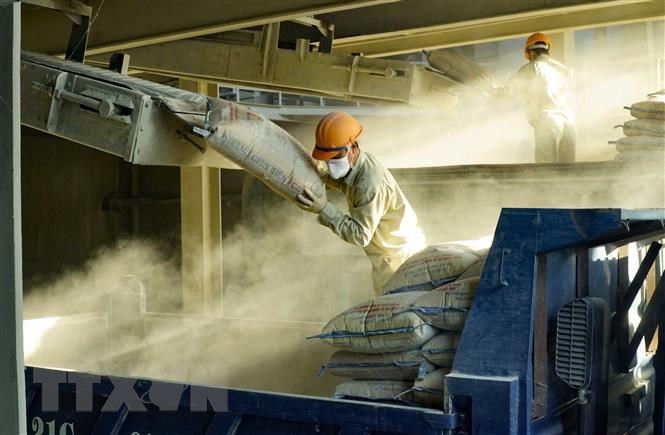The European Union (EU)’s Carbon Border Adjustment Mechanism (CBAM), which is set to take effect in 2024, will impact production and trade activities of Vietnamese manufacturers, especially in high carbon emission industries like iron and steel, aluminium and cement, as well as the whole economy, said experts.
Hanoi (VNS/VNA) – The European Union (EU)’s Carbon Border Adjustment Mechanism (CBAM), which is set to take effect in 2024, will impact production and trade activities of Vietnamese manufacturers, especially in high carbon emission industries like iron and steel, aluminium and cement, as well as the whole economy, said experts.
The mechanism, just updated by the EU and the European Parliament (PE) this February, is created to make a fair playing field for European businesses facing carbon prices by imposing a carbon border tax on imports from countries that do not apply equivalent carbon pricing measures.
CBAM will directly affect Vietnamese products and exporters to the EU, said Sirpa Jarvenpaa, Director of Southeast Asia Energy Transition Partnership (ETP), adding that exporters will have to ensure that products exported to the EU meet a corresponding tax rate as EU manufacturers are imposed.
“CBAM has a crucial meaning to Vietnam as the country is a major exporter to the EU,” Jarvenpaa said.
“The results of the impact assessment of the CBAM at this workshop provide a comprehensive view of the difficulties and policies affecting Vietnam and how CBAM contributes to the energy transition to help Vietnam reduce carbon emissions.”
“It also shows the difficulties due to the technical complexity in determining the carbon tax rate in Vietnam.”
CBAM will initially apply to imported goods such as steel, cement, fertiliser, aluminium, electricity and hydrogen. They are sectors with a high risk of carbon leakage and high carbon emissions, accounting for 94% of the EU’s industrial emissions.
All 27 EU member countries are expected to begin piloting CBAM in October.
Reducing greenhouse gas emissions is now a trend and a requirement that businesses must follow if Vietnam wants to compete in the international playground.
In research published at the consultation workshop, Vietnam’s steel industry suffers the most from CBAM, followed by the aluminium sector.
According to the research, steel production is estimated to drop 0.8% in 2030 under the effect of CBAM, while export value decreased by 2.3%. In the aluminium industry, the output is estimated to fall by 0.4%, and the export value will be down 4.3% in 2030.
Many surveyed businesses currently do not see CBAM as a threat, but the impact will be significant if the mechanism is expanded.
Even though many countries like the US and Japan showed mixed reactions toward CBAM, they are considering their regulations and raising the need to accelerate global decarbonisation.
Therefore, early preparation for CBAM is necessary, said Do Nam Thang, a political expert from Applied Economic Modelling and Data Analysis.
“CBAM is evolving with many uncertainties, its impacts may grow fast, and we should take early prepare for them,” Thang said. “The mechanism will affect enterprises and the country’s competitiveness in global markets.”/.










